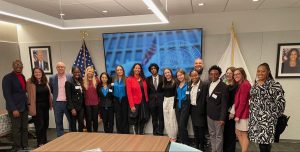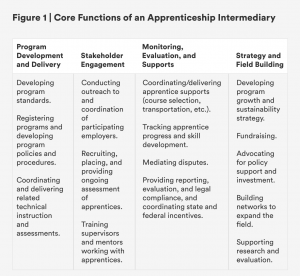Over the last few weeks lawmakers reconvened following a short recess period to address a number of critical issues, including the ongoing budget and appropriations process. Lawmakers have also held hearings with the leaders of federal agencies regarding the Biden administration’s recent budget requests and other policies and priorities. In addition, the Biden administration has made new regulatory announcements on a few issues of importance to the Career Technical Education (CTE) community.
House Holds DOL Oversight Hearing
 On Wednesday, May 1, the House Education and Workforce Committee held a hearing to examine the policies and priorities of the U.S. Department of Labor (DOL). Acting Assistant Secretary Julie Su testified on behalf of the agency and the discussion focused heavily on a multitude of new regulations the Department has proposed or implemented recently. Lawmakers appeared to be particularly skeptical of DOL’s recently proposed apprenticeship regulations which, among other proposed changes, would create a new programmatic structure for apprenticeship programs in K-12 and postsecondary education settings known as Career and Technical Education Apprenticeships (CTEAs).
On Wednesday, May 1, the House Education and Workforce Committee held a hearing to examine the policies and priorities of the U.S. Department of Labor (DOL). Acting Assistant Secretary Julie Su testified on behalf of the agency and the discussion focused heavily on a multitude of new regulations the Department has proposed or implemented recently. Lawmakers appeared to be particularly skeptical of DOL’s recently proposed apprenticeship regulations which, among other proposed changes, would create a new programmatic structure for apprenticeship programs in K-12 and postsecondary education settings known as Career and Technical Education Apprenticeships (CTEAs).
Long-time CTE Caucus co-chair Rep. G.T. Thompson (R-PA) questioned Su extensively on this topic and raised significant concerns regarding the Department’s proposal, the impact it could potential have on learners and CTE programs, and questioned the broader reasoning for this proposed programmatic structure. As a reminder, Advance CTE recently submitted substantial comments in response to this regulatory proposal and have been continuing to monitor and engage with stakeholders on this issue. A full recording of the hearing, including witness testimony, can be found here.
Senate Examines ED’s FY25 Budget Request
Earlier this week, April 30, U.S. Secretary of Education Miguel Cardona testified before the Senate Appropriations Labor, Health and Human Services, Education, and Related Agencies (Labor-HHS-ED) Subcommittee regarding the U.S. Department of Education’s federal fiscal year 2025 (FY25) budget request. In both of their opening remarks, Chair Baldwin (D-WI) and Ranking Member Capito (R-WV) highlighted the importance of CTE and the Carl D. Perkins Career and Technical Education Act (Perkins V), including the need to strengthen investments in these efforts and noting the need to expand access to CTE opportunities for more learners. In addition, the hearing focused heavily on ED’s ongoing challenges in implementing a newly revamped Free Application for Federal Student Aid (FAFSA) and lawmakers questioned Caronda on a number of other topics including the importance of student mental health and newly finalized Title IX regulations. An archived webcast of the hearing, including Cardona’s written testimony, can be found here.
Title IX Rule Finalized
In recent weeks, the U.S. Department of Education (ED) published revised Title IX regulations intended to provide new protections against sex discrimination. “These final regulations clarify Title IX’s requirement that schools promptly and effectively address all forms of sex discrimination,” said ED’s Assistant Secretary for Civil Rights Catherine E. Lhamon as part of the announcement. The new rules are scheduled to come into effect August 1, 2024 and codify new protections for LGBTQ students, staff, and others against discrimination, including on the basis of one’s sexual orientation or gender identity. Additionally, the regulations will allow school districts to use a more uniform grievance process to address all forms of reported discrimination. More information regarding these new rules and implications for the CTE community can be accessed here.
DOL Unveils New Rules on Overtime Pay
Recently, the U.S. Department of Labor issued a new regulation related to worker eligibility criteria for overtime pay under the Fair Labor Standards Act (FLSA). The long-anticipated rules will have significant implications for employers across the country, including for schools, districts, and institutions. These new requirements are set to go into effect January 1, 2025. The regulations will increase current salary thresholds, currently set at $35,568, for workers entitled to time-and-a-half pay when working more than 40 hours in a week, to $43,888. By July 1, 2025, this threshold is set to increase to $58,656. DOL estimates that this will benefit approximately four million workers nationwide. More information on this announcement can be accessed here.
Antisemitism Bill Advanced in the House
Lawmakers in the House considered and advanced the Antisemitism Awareness Act (H.R. 6900)—legislation that would codify the International Holocaust Remembrance Alliance’s definition of antisemitism within existing civil rights legislation. This legislative proposal would also encourage the U.S.  Department of Education (ED) to use this definition when conducting civil rights investigations when seeking to determine whether a complaint was motivated by antisemitism. The legislation was cleared by lawmakers in the House on a wide bipartisan margin of 320-91 late yesterday. Next week, the House Education and Workforce Committee is scheduled to hold a hearing on antisemitism in K-12 schools.
Department of Education (ED) to use this definition when conducting civil rights investigations when seeking to determine whether a complaint was motivated by antisemitism. The legislation was cleared by lawmakers in the House on a wide bipartisan margin of 320-91 late yesterday. Next week, the House Education and Workforce Committee is scheduled to hold a hearing on antisemitism in K-12 schools.
Steve Voytek, Policy Advisor


 This week both the House and Senate were in session ahead of a new funding deadline and the President’s annual State of the Union address to a joint session of Congress last night. The President’s address to Congress featured a range of topics, including how recent federal bipartisan legislation focused on infrastructure and the nation’s advanced manufacturing capacity have helped to spur greater demand for skilled workers. Notably, the President highlighted the importance of Career Technical Education (CTE) noting that his administration is working to connect “…businesses and high schools so students get hands-on experience and a path to a good-paying job whether or not they go to college.”
This week both the House and Senate were in session ahead of a new funding deadline and the President’s annual State of the Union address to a joint session of Congress last night. The President’s address to Congress featured a range of topics, including how recent federal bipartisan legislation focused on infrastructure and the nation’s advanced manufacturing capacity have helped to spur greater demand for skilled workers. Notably, the President highlighted the importance of Career Technical Education (CTE) noting that his administration is working to connect “…businesses and high schools so students get hands-on experience and a path to a good-paying job whether or not they go to college.” 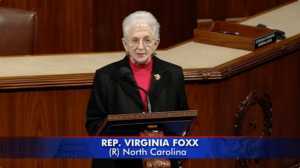
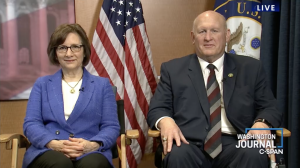
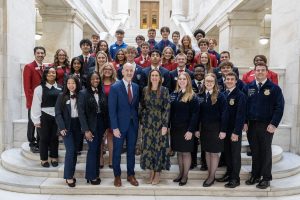
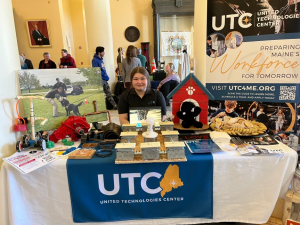 Maine kicked off Career and Technical Education (CTE) Month at the State House with a showcase featuring learners, instructors, and directors from 15 of the state’s 27 CTE centers. The showcase featured learners’ advanced skills in areas from biotechnology and hospitality to welding and graphic design. Notably, every instructor and director at the event reported an increase in “non-traditional students” participating in CTE programs.
Maine kicked off Career and Technical Education (CTE) Month at the State House with a showcase featuring learners, instructors, and directors from 15 of the state’s 27 CTE centers. The showcase featured learners’ advanced skills in areas from biotechnology and hospitality to welding and graphic design. Notably, every instructor and director at the event reported an increase in “non-traditional students” participating in CTE programs. 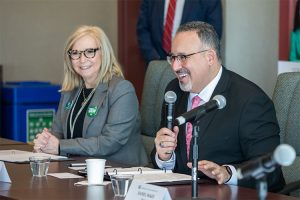 On February 21, U.S. Secretary of Education Miguel Cardona visited the Community College of Rhode Island (CCRI) as part of President Biden’s Investing in America Tour. The visit featured a tour of CCRI’s advanced manufacturing lab, a roundtable discussion with educational leaders, and dialogues with learners. Additional discussions took place with CCRI’s President Rosemary Costigan, Rhode Island Governor Dan McKee, and U.S. Representative Gabe Amo.
On February 21, U.S. Secretary of Education Miguel Cardona visited the Community College of Rhode Island (CCRI) as part of President Biden’s Investing in America Tour. The visit featured a tour of CCRI’s advanced manufacturing lab, a roundtable discussion with educational leaders, and dialogues with learners. Additional discussions took place with CCRI’s President Rosemary Costigan, Rhode Island Governor Dan McKee, and U.S. Representative Gabe Amo. 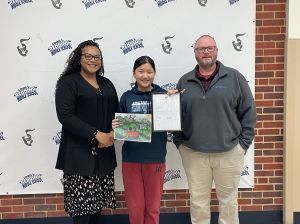 DACCTE Celebrates Poster Contest Winner
DACCTE Celebrates Poster Contest Winner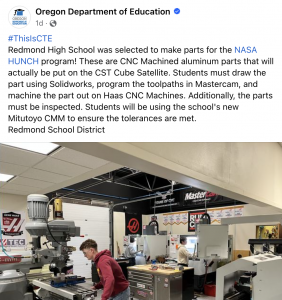
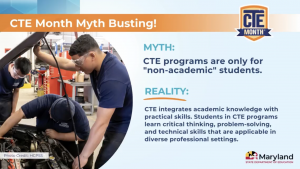
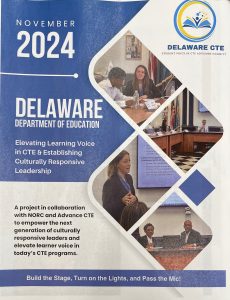 Last month, I had the privilege of attending a briefing at the U.S. Department of Education, led by a group of Career Technical Education (CTE) learners from the state of Delaware. Their expertise and passion demonstrated the true power, inspiration and innovation that can come from centering learners in matters of policy and practice within CTE.
Last month, I had the privilege of attending a briefing at the U.S. Department of Education, led by a group of Career Technical Education (CTE) learners from the state of Delaware. Their expertise and passion demonstrated the true power, inspiration and innovation that can come from centering learners in matters of policy and practice within CTE.